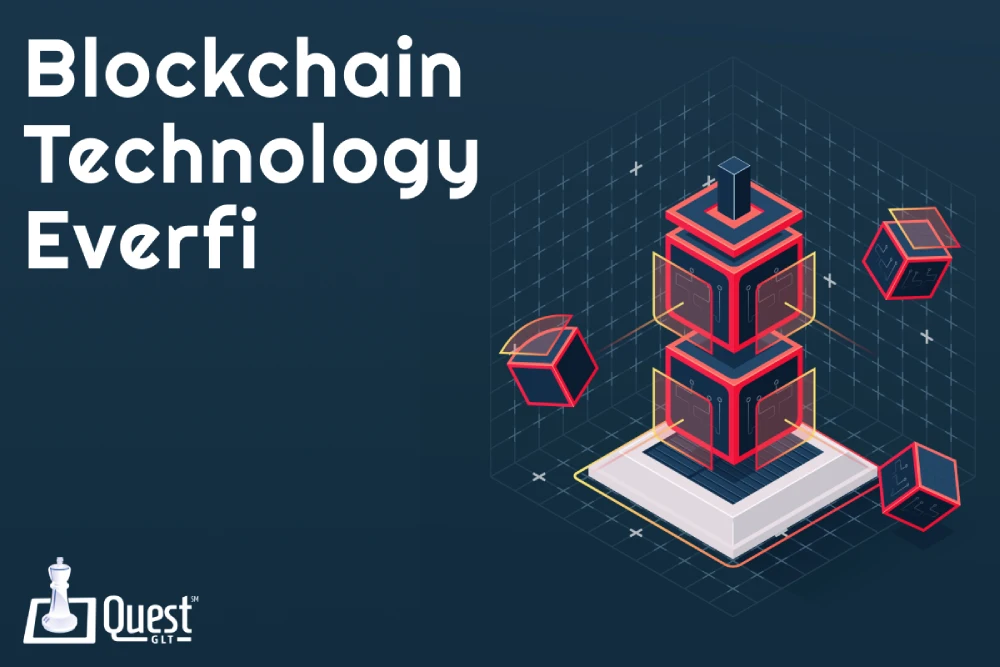
Blockchain technology appears as a new method of handling transactions and managing data. In the digital era, where these ideals are frequently threatened, it personifies security and trust. Blockchain is an impenetrable digital ledger of economic transactions by design, skilled in recording almost everything of value, not just financial transactions.
As blockchain technology is decentralised, that doesn't mean it is dependent on a single point of control. Due to there being no support from a centralised body, there is less risk and a significant reduction in processing and transaction costs. It is extremely crucial for improving data accessibility and probity. From supply chain management to financial transactions — blockchain technology is being used by both individuals and businesses to leverage its potential to ensure accuracy, efficiency, and dependability in a variety of processes.
In this blog, we will discuss the purpose of blockchain technology Everfi, its challenges and future perspectives, but before that let’s explore the brief history of blockchain Development .
The quest for safe, reliable transactions is where the history of blockchain begins. Imagine a world where each digital transaction counts. A ledger is useful for everyone, not just accountants. That was the beginning of our blockchain journey.
The Genesis
Blockchain took its first breath in 2008 after an individual or group known as Satoshi Nakamoto developed it. A fascinating whitepaper emerged. It described a system that would prevent duplicating without the need for an authorised third party. This technique was known as Bitcoin, which irrevocably altered digital business.
Core Principles And Innovation
Trust lies at the core of blockchain, which is built on immutable records known as blocks. Each block links to the next one, comprising a chain—thus it is named blockchain Services. All transactions are visible to each and everyone, but once written they cannot be altered. This quality is known as immutability.
-
Decentralisation
-
Openness
-
Immutability
Smart contracts are another valiant step in blockchain innovation. They execute contracts automatically when the requirements are met. There are no middlemen, only code that executes the work. In this way, trust is made on predictable, transparent actions rather than just promises.
Looking at the Anatomy of Blockchain Technology
The Anatomy of the Blockchain serves as the foundation for this cutting-edge technology. It helps all transactions and smart contracts. Understanding its features allows us to see how blockchain transforms our digital landscape.
Decentralized Networks
A Decentralized Network disseminates data across several areas. It signifies that no single computer or group is in charge. Everyone has a duplicate copy of the information, which makes the network resilient to attacks or outages.
-
Peer-to-peer structures
-
Each user is a client and a server.
-
No major pinpoint of control
Immutable Ledgers
The Immutable Ledger is a record that cannot be modified. Once data is recorded, it is permanently stored in it. Blockchain’s trustworthiness makes it perfect for monitoring ownership and necessary documents.
-
Data stored in ‘blocks’
-
Each block connected to the previous chain
-
All changes are visible and verifiable
Smart Contracts Functionality
Smart Contracts execute rules and guidelines automatically on the blockchain. They ensure that agreements are followed, eliminating the need for middlemen. They save time and minimise the possibility of mistakes.
-
Contracts run automatically depending on the code
-
The transactions are efficient and transparent
-
Reduce paperwork and expedite processes
The Purposes of Blockchain Technology EverFi
Blockchain technology serves as a digital fortress in the realm of cyber e-commerce. Beyond its secure links, blockchain provides a multitude of purposes. From improving data security to facilitating the transmission of digital currency, its uses are wide and flexible. Let’s look at the essential functions blockchain fulfils in today’s digital world.
Strengthening Security
Blockchain technology takes data protection to the next level. Each data block appears to be sealed in an impenetrable, translucent cage. To prevent a single point of failure, copies of this digital ledger are distributed throughout networks. With its robust architecture, fraud and unauthorized activities hardly stand a chance. The robust security of blockchain protects everything from contracts to personal identities, which is advantageous to many industries.
Enabling Digital Currency
Digital currencies like Bitcoin lay their trust in blockchain technology. Without blockchain, these currencies wouldn't exist — it is like treasures without a vault. Blockchain provides a reliable and transparent method for monitoring each transaction. It guarantees every coin's journey is transparent and tamper-proof, giving users confidence in their digital commerce.
Optimising Supply Chains
With blockchain, you can envision a supply chain that is as agile as a cheetah and transparent as a crystal. It seems as though every product has a distinct backstory that is followed from manufacture to delivery. A comprehensive picture is provided to all chain stakeholders, streamlining procedures and reducing mistakes. Supply chains are changing due to blockchain.
-
Traceability: Track goods from birth to their shelf
-
Efficiency: Cut down on paperwork and manual inspections
-
Authenticity: VErify the source and product quality
The impact of blockchain technology goes well beyond these domains, reverberating across other sectors and functions, highlighting its versatile nature.
The Impact of Blockchain Technology Across Industries
Blockchain technology is far more than what begins with Bitcoin. Companies are harnessing its power to alter their operations across various sectors. Here are some examples of how blockchain is making waves in real estate, finance, and the healthcare sector.
Changes in the Finance Sector
Blockchain is causing significant changes in the banking industry. With this technology, transactions are made secure. It eliminates middlemen such as banks. This indicates cheaper and faster money transfers all around the world. The following are the key points of transformation:
-
Agreements are automatically automated via smart contracts.
-
Cryptocurrencies provide new investment opportunities.
-
The audit trails of blockchain boost trust and security.
Transforming the Healthcare Sector
Blockchain guarantees patient data security in the healthcare industry. Hospitals and doctors may safely and easily share information. Look at how it is transforming things:
-
Medical records are both accessible and secure.
-
Data related to medical research is kept in a worldwide ledger.
-
Drug tracing combats counterfeit medications.
Changing the Real Estate
Blockchain is giving real estate investing a digital makeover. The procedure is becoming more simpler and clearer. This is what's evolving:
-
Title Records - Blockchain provides tamper-proof and digital histories for property titles. Due to distributed ledger technology, it become immutable. With this technology - the risk of fraud & disputes is reduced.
-
Exchanges - Smart contracts make transactions faster & efficient. This platform automatically executes terms, streamlines the transaction process and reduces the need for middlemen.
-
Real estate administration - dApps are making the management work more effective. These apps use blockchain’s decentralized nature to provide safe & transparent platforms for managing rental agreements, leasing and others.
Challenges and Considerations Faces in Blockchain Implementation
Scalability Issue
It is a bigger obstacle for blockchain technology within the EverFi ecosystem. As user engagement and volume transactions rise, these networks might find it difficult to manage the burden, which results in slower responses & higher transaction costs.
Regulatory Hurdles
This barrier also plays an important role, as the legislative landscape controlling blockchain and cryptocurrencies is complicated and constantly changing. Compliance with multiple local & international laws complicates EverFi’s operations, necessitating ongoing monitoring & flexibility to guarantee legal adherence while still providing new solutions.
Integration Complexities
EverFi faces further challenges while deploying blockchain technology due to integration complications. Integrating blockchain with existing systems & platforms requires planning, modifications, and collaboration among numerous stakeholders. Ensuring a smooth interoperability while avoiding current activities disruptions.
Exploring the Future Perspectives of Blockchain Technology
When thinking about the blockchain’s future, there is genuine enthusiasm. The technology that was first introduced by Bitcoin is currently in many parts of our digital realm. It’s not only for finance anymore. Blockchain demonstrates potential in the way we use the internet and vote. Let's investigate what could lie ahead.
Progress in Scalability
Blockchain has difficulties processing large amounts of data quickly. As it expands, it becomes tougher. But IT experts are working on it. They’re developing new ways for blockchain to communicate. As a result, this makes everything faster and easier. Faster blockchains and better services will benefit everyone.
-
By handling transactions outside of the main chain, layer two solutions may help.
-
To speed up processing, the database is divided using sharding.
-
Blockchains may grow without slowing down with these tools.
Blockchain And IoT
The Internet of Things (IoT) is enormous! It’s about gadgets interacting with each other. Consider that your refrigerator placing your milk order. However, it must be secure. Here, blockchain can help. It can improve the security and trustworthiness of device connectivity.
-
Blockchain improves the security of devices by utilising strong data encryption mechanisms. It protects the confidentiality and inaccessibility of private information by encrypting data at each stage of connection.
-
It enables anonymous IoT transactions, guaranteeing user privacy and sensitive data. Using cryptographic methods reduces the danger of hacking and fraud
-
This technology creates a decentralized framework, removing discrete points of error and increasing stability.
-
Blockchain is altering the legal framework for IoT deployment. Its transparency and auditability enable authorities to track and impose compliance more efficiently.
Rules are necessary. They maintain order in our world. As blockchain is new, requires rules too. Governments around the world are enacting legislation to support it. This influences how individuals and businesses use blockchain.
-
Governments are creating blockchain laws to protect users.
-
These laws decide how to use blockchains safely.
-
Prudent rules can lead to increased blockchain adoption and trust.
Conclusion
Blockchain technology is a game-changer in the digital realm, revolutionizing how trust and safety are interpreted & implemented in a wide range of applications. As Everfi uncovers its diverse roles, we have a better expertise of its immense future possibilities. Although blockchain is still in its early stages, it’s the opportunity to unlock extraordinary value and encourage innovation across an array of industries. With its potential to protect data integrity, & promote transparency, it brings a new era of development & societal evolution blockchain pr agency imperium comms.
At its core, blockchain indicates a major shift in how we think about and execute faith in digital transactions. This technology offers data consistency & durability by using decentralised













